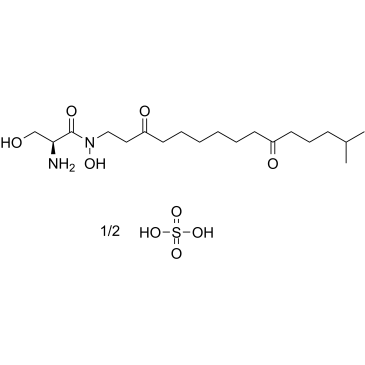Lipoxamycin hemisulfate
Modify Date: 2025-08-25 09:51:42

Lipoxamycin hemisulfate structure
|
Common Name | Lipoxamycin hemisulfate | ||
|---|---|---|---|---|
| CAS Number | 11075-87-9 | Molecular Weight | 421.54 | |
| Density | N/A | Boiling Point | N/A | |
| Molecular Formula | C19H36N2O5.1/2H2O4S | Melting Point | N/A | |
| MSDS | N/A | Flash Point | N/A | |
Use of Lipoxamycin hemisulfateLipoxamycin hemisulfate is an antifungal antibiotic and a potent serine palmitoyltransferase inhibitor with an IC50 of 21 nM[1][2]. |
| Name | Lipoxamycin hemisulfate |
|---|
| Description | Lipoxamycin hemisulfate is an antifungal antibiotic and a potent serine palmitoyltransferase inhibitor with an IC50 of 21 nM[1][2]. |
|---|---|
| Related Catalog | |
| Target |
Serine palmitoyltransferase[1] |
| In Vitro | Lipoxamycin has antifungal activity against a panel of humanpathogenic fungi with better potency against some of the Candida species (MIC values, 0.25-16 µg/mL). Cryptococcus neoformans is the most sensitive organism, followed by various species of Candida. Other filamentous fungi are sensitive to the Lipoxamycin in disk diffusion assays[1]. Lipoxamycin has a long alkyl chain and an amino-containing polar head group. Lipoxamycin is on the same order of potency as the sphingofungins and also have potent activity against the mammalianenzyme[1]. |
| In Vivo | Lipoxamycin is highly toxic in mice when applied subeutaneously or topically. Toxicity may be mechanism based, since studies with a Chinese hamster ovary cell mutant have shown that the serine palmitoyltransferase is an essential enzymein mammalian cells[1]. |
| References |
| Molecular Formula | C19H36N2O5.1/2H2O4S |
|---|---|
| Molecular Weight | 421.54 |